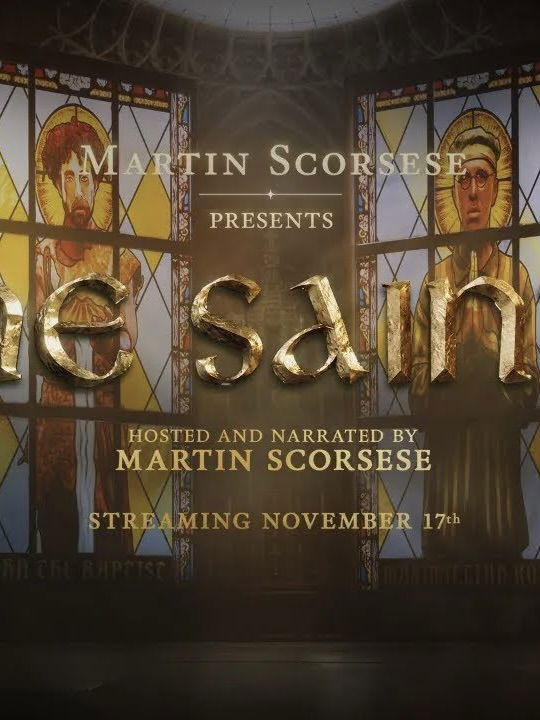"Close to Accurate Can Be a Big Miss"

| None | Light | Moderate | Heavy | |
|---|---|---|---|---|
| Language | ||||
| Violence | ||||
| Sex | ||||
| Nudity |
What You Need To Know:
The cinematography in “Joan of Arc” and “John the Baptist” is exquisite, but the acting is sometimes rushed. Also, the commentary in the two epilogues ultimately feels limited. Worse, there’s an omission of some scriptural passages, including a noticeable absence of the Holy Spirit in the baptism scene of Jesus. Thus, the two episodes are tainted by some humanist anti-supernaturalism. Finally, the first two episodes of THE SAINTS also contain some sex-related material and violence. So, MOVIEGUIDE® advises extreme caution.
Content:
More Detail:
MARTIN SCORCESE PRESENTS: THE SAINTS is a valiant attempt at retelling the stories of various Catholic Saints throughout history. The cinematography is well done, but the acting is rushed in many places. The commentary led by Scorcese and highly controversial Father James Martin ultimately feels limited. There is an omission of some important biblical passages, and a noticeable absence of any mention of the Holy Spirit in the first two episodes. MOVIEGUIDE® advises extreme caution for missing biblical context and some revisionist history.
Episode 1: “Joan of Arc” tells the courageous story of the 15th Century peasant girl, “Joan the Maid.” Joan grows up in a French village, which was pillaged by the English during the Hundred Years War. As a young girl, she begins to hear voices. At first, she’s afraid, but comes to understand these voices are from God, St. Micheal, St. Margaret and St. Catherine. The voices tell her to go to the King dressed as a man. She must convince the King to send her out to command an army to conquer the English forces in France.
Though an unlikely feat, Joan convinces the King to send her out with an army. She leads her army to victory in battles from May to July 1429, along the Loire River. The humiliation and embarrassment suffered by the English was unmatched. The King of France credits Joan for the French victory and the reinstatement of his Kingship.
However, the King desires peace with England, though Joan wants to keep fighting. English forces capture, torture and burn Joan at the stake. Sadly, the King does nothing to rescue her. Referring to herself as Joan the Maiden, Joan goes to the stake confessing that she’s a faithful daughter of God who only wants to do His will.
The talented Liah O’Prey portrays a believable JOAN OF ARC, in a masterfully done period piece. The wardrobe is right on target, with set locations that produce some wonderful cinematography. This episode stresses the absolute unshakeable Christian faith of Joan of Arc, and the importance of doing God’s will no matter what the consequences. Father James Martin, in the commentary, states that the church sees virginity as a type of power for a woman. Violence and war-related images, along with a few brief scenes where Joan is violated to confirm her virginity, warrant extreme caution overall.
Episode 2: “John the Baptist” is about the Prophet John the Baptist from the four gospels in the New Testament, who’s described as the one sent “to prepare a way for the Lord.” The son of a Levite, John grows disgusted with the hypocrisy of the royal and Jewish leaders in Jerusalem. Motivated by politics and greed, the establishment supports the reign of the Roman Puppet Herod who rules them.
John wanders the desert searching for answers. He settles in the Judean desert caves. He notices that his people are desperately awaiting the promised Messiah. He begins to preach of the coming Messiah, baptizing people as a ritual cleansing custom of the Jews. Jesus requests that John baptize him. John says he’s not worthy but baptizes Jesus.
John is very vocal on his criticism of Herod and his immoral lifestyle. Herod’s wife, Herodias, wants revenge. John is arrested and subsequently killed in a twisted plot orchestrated by Herodias and her daughter Salome.
“John the Baptist” suffers in the storyline due to the omission of historical biblical facts. John wanders the desert not knowing why he is there or who he is. When asked if he believes that there is a Messiah coming, he at first claims he doesn’t know. However, in the biblical text, John leapt in his mother’s womb at the sound of the pregnant Mary’s voice because he recognized the unborn Savior. Thus, John was the first to recognize Jesus the Messiah before either he or Jesus were even born. Moreover, in the Gospel of Luke 1:39-45, John’s mother, Elizabeth, immediately praises Mary’s baby and praises Mary as the mother of “my Lord.” So, John probably would have known from his own mother about Jesus and his identity as the Messiah.
Another flaw in this episode is in the explanation of why John baptizes Jesus. During the discussion at the end, Director Martin Scorsese says one reason Jesus asks John to baptize him to validate John’s ministry of baptism. However, the episode doesn’t include the moment in the baptism of Jesus where the Holy Spirit descends on Jesus in the form of a dove, and God the Father in Heaven says, “This is my beloved Son, with whom I am well pleased.” The episode also omits the reference to the Holy Spirit where John tells the people beforehand that the Messiah will baptize them with “the Holy Spirit and with fire.” It just mentions Jesus baptizing people with fire.
Thus, Episode 2: “John the Baptist” ultimately misses the mark and turns John’s story into more of a human story rather than a story about God acting in history. Also, the acting seems rushed, and the chemistry between the actors is missing. However, episode shows John the Baptist has a shows a desire to find God, to please God, and to fulfill His will. In addition, one of the people in the epilogue says Christians believe Jesus is “Fully God and Fully Man.” Episode 2: “John the Baptist” also has some violent scenes, including the display of John’s head on a platter, along with suggestive dancing and adult references to King Herod’s adultery. So, MOVIEGUIDE® advises extreme caution.



 - Content:
- Content: 



